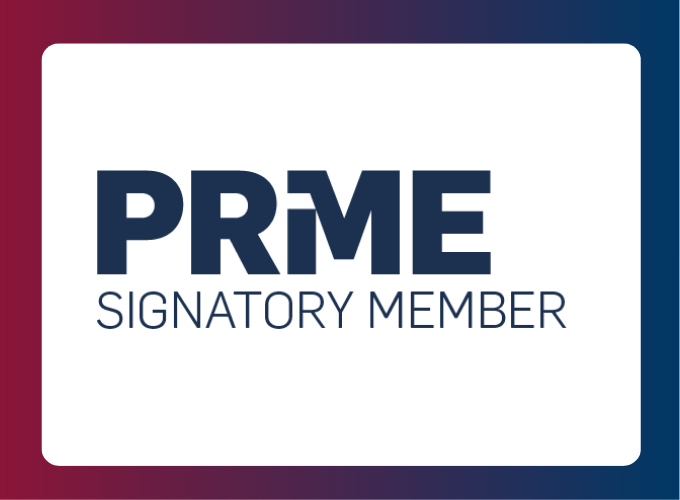
Business Administration
Where Business Comes to Life
The Hill Levene School of Business at the University of Regina graduates career-ready, critical thinkers, and changemakers. Through experiential learning and support from dedicated faculty, staff, and alumni, we nurture curiosity and a passion for learning. Our undergraduate students are empowered to lead community initiatives, activities, and competitions. At the graduate level, we empower students to elevate their careers through a comprehensive business education that emphasizes global perspectives and strategic leadership. Our graduates stand out for their exceptional performance in their chosen field, contributing to organizational success.
Explore Business
About Us
Business Collision
Research
Discover Programs
Undergraduate Programs, Diploma and Certificates
High school students, ready to make the next big move? The Bachelor of Business Administration (BBA) Program is right for you!
BBA with Majors in:
- Accounting
- Finance
- General Business Studies
- Human Resource Management
- Marketing
Other BBA Opportunities:
- Business Law Option
- Bachelor of Business Administration / Bachelor of Sports & Recreation Studies Internship Joint Program
Not quite ready for a full program? Check out our two-year diploma program and certificates!
Graduate, Master's Programs and Certificates
Ready to expand your earning potential and grow your career? A Levene master program is what you need!
- Executive Master of Business Administration (EMBA)
- Master of Business Administration (MBA)
- Master of Human Resource Management (MHRM)
- Master of Administration in Leadership
- Master of Science in Organization Studies
Not quite ready for a full program? Check out our certificate programs: Human Resources Management (HRM), Organizational Leadership, Project Management, Labour Relations, and Equity, Diversity, Inclusion and Indigenization (EDII)
Experiential Learning Programs
Through Business Collision, our experiential learning programs include:
- Women’s Mentoring Circle: A mentorship program connecting women business students with executive mentors to build leadership skills, confidence, and professional networks.
- Voices of Impact Webinar Series: A virtual speaker series, led by Jada Yee, featuring Indigenous entrepreneurs and leaders sharing real-world insights, career journeys, and cultural perspectives with students.
- Around the Table: Leadership Conversations with Kathryn: An informal conversation series where students engage with Kathryn Pollack on leadership, career development, and navigating professional challenges.
- Fail UP: A cohort-based, non-credit program focused on learning from entrepreneurial failure.
- Innovation Challenge: A fast-paced interdisciplinary competition tackling real-world wicked problems.
- DEII Digital Badge: A credential that builds knowledge in diversity, equity, inclusion, and Indigenization.
- Imagineur: A free online program teaching foundational business, innovation, and entrepreneurship skills.
Announcements

Hill Levene School Join Global PRME Network
The Hill evene School of Business is proud to announce that we have become official signatories of the Principles for Responsible Management Education (PRME).
PRME is a United Nations-supported initiative focused on advancing responsible management education and sustainable development worldwide.

Now Launching: Digital Marketing Programs Built for Today’s Economy
Whether you're just starting out or looking to upskill, our new Diploma in Digital Marketing and Certificate in Digital Marketing give you the real-world tools employers are asking for—from SEO and social media to Google Ads, HubSpot, and more.

New BUS 400 Requirement
Students enrolling in BUS 400 Strategic Management are required to complete BUS 009 Business Fundamentals Assessment as a pre-requisite.
This new requirement has been introduced based on an identified need brought forward from Hill students and instructors and has been designed to help you confidently tackle the challenges of BUS 400.
Student Hub

Current Undergraduate Hill Students
View the resources and support available to you as a current Hill student.
Check the student group and experiential opportunities available to you!

Current Graduate Levene Students
View the resources and support available to you as a current Levene student.
Check the student group and experiential opportunities available to you!
Innovation Challenge 2026
Accreditation and Partnerships
The Hill School of Business has a long term strategic agreement with the Ivey Business School at Western University. Our relationship with the Ivey Business School creates unique opportunities for students and faculty.
Hill-Ivey HBA Scholarships
The Hill-Ivey HBA Scholarship is an exclusive opportunity for exceptional Hill students. A limited number of scholarships are awarded to students who have completed their first two years (60 credit hours) at the Hill School and who meet all the requirements for admission to the Ivey Honours Business Administration program (Ivey HBA). These students enter the Ivey HBA and complete their final two years at the Ivey Business School.
- Scholarship recipients receive $20,000 for each of the two years they attend Ivey.
- To date 34 Hill students have received this scholarship.
- Talk to your Hill advisor if this opportunity is of interest to you!
Hill-Ivey Case Series
In partnership with the Ivey Business School, faculty members from the Hill School co-author teaching cases which feature organizations and leaders in Western Canada. Fourty-five Hill-Ivey cases on Western Canadian businesses have been published since 2009. Over 128,800 copies have been distributed and used in 98 countries (as of March 2022).
Ivey experts also visit Hill to deliver workshops on the case method for teaching, as well as on case writing. These experiences serve to enrich the classroom experience for Hill students.
Hill-Ivey Faculty Immersion and Visiting Professorships
Faculty members from the Hill School have the opportunity to engage in an immersion experience at Ivey and professors from Ivey visit the Hill School. The intent is to develop and enhance case writing, teaching, and research partnerships amongst Hill and Ivey faculty members.
The areas of collaboration for Ivey visiting professors include Entrepreneurship, Agribusiness, Energy and International Business.
The Hill School of Business is accredited with the Chartered Professionals in Human Resources (CPHR) Saskatchewan.
This accreditation may be of interest to both recent alumni and current students of the Hill School of Business in the Faculty of Business Administration. BBA graduates with a major in Human Resource Management (HRM) may be eligible for exemption from the requirement to write the CPHR National Knowledge Exam (NKE) if these eligibility criteria are met:
- Graduated with a Bachelor of Business Administration (BBA) degree with a Human Resource Management (HRM) major on or after April 2017;
- Completed the following courses, either as part of the BBA degree or outside the degree:
- BUS 354 Occupational Health and Safety or BUS 355 Issues in Labour Relations
- BUS 356 Staffing Organizations
- BUS 357 Compensation
- BUS 358 Training and Development
- BUS 361 Management of Performance; and
- Have a cumulative average of 70% or higher.
- Graduates must apply for the NKE Waiver within 5 years of convocation, with the exception of those who convocated in 2017 who have until December 31, 2023 to apply for the waiver.
Those who have completed their BBA with an HRM major on or after April 2017 but are missing any classes from the list above can apply to the University of Regina as a Special Student to take the required courses. Please contact Hill student services at Hill.Undergrad@uregina.ca to be connected with a program advisor who can help with this process.
Find more information about the CPHR designation.
CPHR Student Membership
A $50 CPHR student membership is available for full time Hill HR students.
Student membership is open to individuals who are registered in a full-time post-secondary program of study and who are not employed on a full-time basis.
Exclusively for Levene MBA students
The Levene School is proud to be one of only three schools in Canada to have a partnership with Harvard Business School's online branch HBS Online. This partnership allows Levene MBA students to take advantage of low tuition rates for courses taught by Harvard Business School faculty members. MBA students are eligible to take up to two courses through HBS Online Credential of Readiness (CORe) program and have the credits transferred to their Levene MBA program. Students may also complete a third course (Financial Accounting) to earn the CORe certificate from HBS Online and Harvard Business School.
What courses are eligible for transfer credit into my MBA program?
Two of the three courses offered in the HBS Online CORe program are eligible for transfer credit to your Levene MBA program. They are:
- Economics for Managers
- Business Analytics*
*Considered equivalent to MBA 880 - Managing Information, Analytics and Decision-making, which is a core course in the MBA program. Students may only take Business Analytics with HBS in semesters when MBA 880 is not offered through the Levene Graduate School of Business.
What are the tuition fees?
Because of our partnership with HBS Online, if you indicate at the time of registration you want to be considered for a scholarship or financial aid, you will receive a discount, thus reducing the cost per course or reducing the cost of the CORe certificate. Please check with levene.advising@uregina.ca for further details on the costs.
Note: In order to receive the discount by HBS, applicants must indicate the collaborating college (i.e. Levene Graduate School of Business – University of Regina) during the application process, followed by notifying levene.advising@uregina.ca that you have completed this step. Applicants will then wait to see the discount applied to your HBS online student account tuition balance and then you may pay the remaining balance. If an applicant pays for the tuition prior to the discount being applied, the discount will no longer be applicable to your HBS CORe course(s).
What is the Application Process?
Prior to applying for HBS Online courses, students should discuss the transfer credit HBS courses with the Levene Advisor by emailing levene.advising@uregina.ca. Following this discussion, you will be required to complete and submit a Request for Transfer Credit Form (PDF) to the Levene GSB. Refer to your Levene student handbook or the FGSR web page for information on transfer credit policies.
The Levene School and the Canadian Police College (CPC) have a Transfer Credit Agreement for block transfer credit (advanced standing) for applicants who have completed the CPC’s Executive Development in Policing program.
Under the agreement, the University of Regina will provide eligible applicants admitted to a Levene GSB programs, up to six credit hours of advanced standing, applicable to open electives exclusively. The agreement is applicable to applicants who have completed the Executive Development program on or after June 30, 2015. Those who completed the program prior to June 30, 2015 and who have been admitted to the Levene GSB may be approved for advanced standing on a case-by-case basis with the approval of the Faculty of Business Administration and the Faculty of Graduate Studies and Research.
Exclusively for Levene students
The Levene School is proud to partner with the Canadian Association of Certified Management Consultants (CMC Canada).
Student members of the Levene CMC program will have access to the CMC-Canada online community which includes access to guest speakers potential and career mentors, professional development events (special student rates may apply) and job postings. The CMC online community includes student members from other Canadian academic institutions that provides the opportunity for peer networking.
Thanks to our partnership with CMC, the CMC Canada student membership fee is waived for Levene students (please enquire to Levene.gradschool@uregina.ca or reach out directly to CMC at Membership@cmc-canada.ca).
Levene GSB offers the following courses that qualify toward the CMC designation:
For students in the Levene MHRM program
|
CMC – Canada Components |
Levene GSB |
|---|---|
|
1. Essentials of Management Consulting |
GBUS 867: Essentials of Management Consulting |
|
2. Project Management |
GBUS 865: Project Management |
|
3. Interpersonal/Personal Skills |
GBUS 817: Human Behavior in Organizations AND GBUS 873: Negotiation and Conflict Resolution |
The required Ethical Behavior course is available to Levene students through CMC Canada directly or through engagement of a CMC Canada trained facilitator.
Experience requirements for the CMC designation are not included in the scope of the Agreement. Candidates are responsible for presenting the appropriate evidence of fulfilment of experience requirements directly to CMC Canada as well as completing other components of the CMC certification. CMC Canada will recognize any management consulting project hours completed in the MHRM program.
For students in the MAdmin (Leadership) program
|
CMC – Canada Components |
Levene GSB |
|---|---|
|
1. Essentials of Management Consulting |
GBUS 867: Essentials of Management Consulting |
|
2. Project Management |
GBUS 865: Project Management |
|
3. Interpersonal/Personal Skills |
GBUS 817: Human Behavior in Organizations AND GBUS 873: Negotiation and Conflict Resolution |
The required Ethical Behavior course is available to Levene students through CMC Canada directly or through engagement of a CMC Canada trained facilitator.
Experience requirements for the CMC designation are not included in the scope of the Agreement. Candidates are responsible for presenting the appropriate evidence of fulfilment of experience requirements directly to CMC Canada as well as completing other components of the CMC certification. CMC Canada will recognize any management consulting project hours completed in the MAdmin program.
For students in the Levene MBA program
|
CMC – Canada Components |
Levene GSB |
|---|---|
|
1. Essentials of Management Consulting |
GBUS 867: Essentials of Management Consulting |
|
2. Project Management |
GBUS 865: Project Management |
|
3. Interpersonal/Personal Skills |
MBA/GBUS 860: Change Management AND GBUS 865: Project Management |
The required Ethical Behavior course is available to Levene students through CMC Canada directly or through engagement of a CMC Canada trained facilitator.
Experience requirements for the CMC designation are not included in the scope of the Agreement. Candidates are responsible for presenting the appropriate evidence of fulfilment of experience requirements directly to CMC Canada as well as completing other components of the CMC certification. CMC Canada will recognize any management consulting project hours completed in the MBA program.
For students in the EMBA program
|
CMC – Canada Components |
Levene GSB |
|---|---|
|
1. Essentials of Management Consulting |
EMBA 870: International Study Couse |
|
2. Interpersonal/Personal Skills |
EMBA 820: Negotiation and Conflict Management AND EMBA 805 Perspectives on Leadership |
The required Ethical Behavior course is available to Levene students through CMC Canada directly or through engagement of a CMC Canada trained facilitator.
Experience requirements for the CMC designation are not included in the scope of the Agreement. Candidates are responsible for presenting the appropriate evidence of fulfilment of experience requirements directly to CMC Canada as well as completing other components of the CMC certification. CMC Canada will recognize any management consulting project hours completed in the EMBA program.
The Agreement of collaboration between Kenneth Levene Graduate School of Business (Levene GSB) and Instituto Panamericano de Alta Direccion de Empresa, Universidad Panamericana (IPADE) facilitates international education and research opportunities for faculty and students, seeking to promote the internationalization at their respective institutions, and exploring cooperation based on equality and reciprocity of benefits.
Each year, the U of R, through Levene GSB, extends an invitation to a visiting professor or researcher from IPADE to hold the position of Chair for a maximum period of four (4) weeks. During their visit, the Chair supports and undertakes activities such as research, teaching, analysis and dissemination of information about Mexico. This cooperation continues to increase knowledge about Mexico within the Canadian academic community and society, as well as to encourage exchanges and cooperation between IPADE and Levene GSB.
The Hill School of Business has Transfer Credit agreements with the following institutions:
Information For You
Upcoming Events
Featured Stories
Contact Us
5th and 6th floors
Education Building, University of Regina
3737 Wascana Parkway
Regina, SK S4S 0A2
Undergraduate Email: hill.undergrad@uregina.ca
Graduate Email: levene.gradschool@uregina.ca